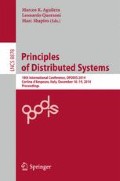Abstract
A self-stabilizing algorithm converges to its designated behavior from an arbitrary initial configuration. It is standard to assume that each process maintains communication with all its neighbors. We consider the problem of self-stabilizing construction of a breadth first search (BFS) tree in a connected network of processes, and consider algorithms which are not given the size of the network, nor even an upper bound on that size. It is known that an algorithm that constructs a BFS tree must allow communication across every edge, but not necessarily in both directions. If m is the number of undirected edges, and hence the number of directed edges is 2m, then every self-stabilizing BFS tree algorithm must allow perpetual communication across at least m directed edges. We present an algorithm with reduced communication for the BFS tree problem in a network with unique identifiers and a designated root. In this algorithm, communication across all channels is permitted during a finite prefix of a computation, but there is a reduced set of directed edges across which communication is allowed forever. After a finite prefix, the algorithm uses only m + n − 1 directed edges for communication, where n is the number of processes in the network and m is the number of edges.
Access this chapter
Tax calculation will be finalised at checkout
Purchases are for personal use only
Preview
Unable to display preview. Download preview PDF.
References
Aguilera, M.K., Delporte-Gallet, C., Fauconnier, H., Toueg, S.: Stable leader election. In: Welch, J. (ed.) DISC 2001. LNCS, vol. 2180, pp. 108–122. Springer, Heidelberg (2001)
Aguilera, M.K., Delporte-Gallet, C., Fauconnier, H., Toueg, S.: On implementing omega with weak reliability and synchrony assumptions. In: Proceedings of the 22rd ACM Symposium on Principles of Distributed Computing, pp. 306–314 (2003)
Aguilera, M.K., Delporte-Gallet, C., Fauconnier, H., Toueg, S.: Communication-efficient leader election and consensus with limited link synchrony. In: Proceedings of the 23rd ACM Symposium on Principles of Distributed Computing, pp. 328–337 (2004)
Biely, M., Widder, J.: Optimal message-driven implementations of omega with mute processes. ACM Transactions on Autonomous and Adaptive Systems 4(1), 4:1–4:22 (2009)
Datta, A.K., Larmore, L.L., Vemula, P.: Self-stabilizing leader election in optimal space under an arbitrary scheduler. Theoretical Computer Science 412(40), 5541–5561 (2011)
Delporte-Gallet, C., Devismes, S., Fauconnier, H.: Robust stabilizing leader election. In: Masuzawa, T., Tixeuil, S. (eds.) SSS 2007. LNCS, vol. 4838, pp. 219–233. Springer, Heidelberg (2007)
Devismes, S., Masuzawa, T., Tixeuil, S.: Communication efficiency in self-stabilizing silent protocols. In: Proceedings of the 29th International Conference on Distributed Computing Systems, pp. 474–481 (2009)
Dolev, S.: Self-stabilization. MIT Press (2000)
Dolev, S., Schiller, E.: Communication adaptive self-stabilizing group membership service. In: IEEE Transactions on Parallel and Distributed Systems, pp. 709–720 (2003)
Kutten, S., Zinenko, D.: Low communication self-stabilization through randomization. In: Lynch, N.A., Shvartsman, A.A. (eds.) DISC 2010. LNCS, vol. 6343, pp. 465–479. Springer, Heidelberg (2010)
Larrea, M., Fernandez, A., Arevalo, S.: Optimal implementation of the weakest failure detector for solving consensus. In: Proceedings of the 19th IEEE Symposium on Reliable Distributed Systems, pp. 52–59 (2000)
Masuzawa, T.: Silence is golden: Self-stabilizing protocols communication-efficient after convergence. In: Défago, X., Petit, F., Villain, V. (eds.) SSS 2011. LNCS, vol. 6976, pp. 1–3. Springer, Heidelberg (2011)
Masuzawa, T., Izumi, T., Katayama, Y., Wada, K.: Brief Announcement: communication-efficient self-stabilizing Protocols for spanning-tree construction. In: Abdelzaher, T., Raynal, M., Santoro, N. (eds.) OPODIS 2009. LNCS, vol. 5923, pp. 219–224. Springer, Heidelberg (2009)
Takimoto, T., Ooshita, F., Kakugawa, H., Masuzawa, T.: Communication-efficient self-stabilization in wireless networks. In: Richa, A.W., Scheideler, C. (eds.) SSS 2012. LNCS, vol. 7596, pp. 1–15. Springer, Heidelberg (2012)
Author information
Authors and Affiliations
Editor information
Editors and Affiliations
Rights and permissions
Copyright information
© 2014 Springer International Publishing Switzerland
About this paper
Cite this paper
Datta, A.K., Larmore, L.L., Masuzawa, T. (2014). A Communication-Efficient Self-stabilizing Algorithm for Breadth-First Search Trees. In: Aguilera, M.K., Querzoni, L., Shapiro, M. (eds) Principles of Distributed Systems. OPODIS 2014. Lecture Notes in Computer Science, vol 8878. Springer, Cham. https://doi.org/10.1007/978-3-319-14472-6_20
Download citation
DOI: https://doi.org/10.1007/978-3-319-14472-6_20
Publisher Name: Springer, Cham
Print ISBN: 978-3-319-14471-9
Online ISBN: 978-3-319-14472-6
eBook Packages: Computer ScienceComputer Science (R0)

